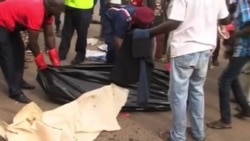The year 2014 saw Nigerian militant sect Boko Haram intensify its five-year insurgency and target civilians in large numbers as it seized territory in the northeast. The kidnapping of nearly 300 schoolgirls in Chibok in April sparked global outrage, but failed to become the turning point against the sect that Nigeria’s president said it would be. The picture at year's end is one of devastation and uncertainty.
Boko Haram released a video this week of gunmen massacring dozens of men identified only as “prisoners” and “infidels.” The floor of a school dormitory is filled with bodies. Shooters walk over them to finish off those still breathing.
The video marks a gruesome end to the sect’s bloodiest year to date.
Rights groups say militant Islamist sect Boko Haram killed more than 2,000 people in the first half of 2014 alone. That’s almost as many as were killed in the previous four years of the insurgency combined.
In the northeast, Nigerians mourn the dead and the disappeared.
The 219 Chibok schoolgirls are still missing. Boko Haram grabbed the girls from their dormitories in April. It woke the world up to terror in northeastern Nigeria.
The twitter hashtag #BringBackOurGirls trended globally. The movement still holds daily rallies in Nigeria.
Meanwhile, insurgents seized towns and villages in the northeast. They burned, looted and slaughtered. They conscripted young men and kept right on kidnapping women and girls for use as “wives” and servants.
At year’s end, fighting had displaced more than one million Nigerians.
In August, Boko Haram leader Abubakar Shekau declared a “caliphate,” a designation analysts say is more aspirational than actual.
Some analysts say the military seems to be “gaining,” but it's hard to measure. The military retakes some towns even as Boko Haram threatens others.
It’s a “war of attrition,” according to Yola-based professor Kyari Mohammed, who studies the insurgency.
“Even if the military were able to push them out of all the urban centers, it is still going to be difficult for them to secure lives and property in the several villages around those areas, so this is going to be a major problem. It’s like they will have to patrol and they will have to physically be present in every inch of the territory. That is going to be very difficult,” said Kyari Mohammed.
Boko Haram continued bombing in 2014 as well. There were three major suicide attacks in the month of November alone.
One was at a boy’s school in Potiskum. At least 47 students there were killed. Another was at a mosque in Kano. At least 120 people were killed there and twice as many more were wounded. And another attack at a market in the Borno state capital, Maiduguri, killed at least 45 people.
Borno state governor Kashim Shettima spoke at the scene.
"What these lunatics are doing here is completely at variance with the teaching of Islam. They are plain raging lunatics, and I believe the hottest place in hell will be reserved for these mad men," he said.
The Emir of Kano, Sanusi Lamido Sanusi, called on citizens to arm themselves.
"We should not wait for soldiers to come,” he said, “before they come, the carnage will have been done. Some of them,” he said, “drop their guns and flee.”
Nigeria’s military showed signs of strain in 2014. In all, 66 soldiers were sentenced to death for mutiny in the northeast. Soldiers complained they were sent into battle without adequate equipment.
Cameroon went on the offensive amid Boko Haram attacks on its side of the border. Nigeria met several times with its neighbors to try to put together a coordinated response.
“This is the year where Boko Haram became the real major threat in a region,” said the CEO of the Berlin-based security firm MOSECON, Yan St. Pierre, who monitors Boko Haram.
“They’ve evolved strategically. They’ve shown an inclination for ruthlessness that was unprecedented for them," he said. "It’s not just kidnapping and murders or statistics, if you want to put it that way. What they’ve demonstrated… they’ve become a full-fledged criminal organization with a good financial structure with a good tactical structure, and this is the most dangerous part.”
Nigerian President Goodluck Jonathan is trying to get re-elected in February.
The war grinding on in the northeast sets an ominous stage for that vote.





